|
| Hip Muscle StrainsHip Muscle Injury SymptomsMuscle StrainThis is also known as a 'Grade I' tear. A strain is classified as the overstretching of the fibers of the muscle. Muscle strain feels like discomfort within the hip area as opposed to acute pain. Muscle strains respond very well to conservative treatment protocols. Muscle Tear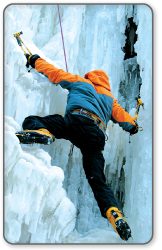 This is also known as a 'Grade II' tear and is an actual tearing of the fibers in the muscle and perhaps its associated tendon. It would feel like a sharp pain within the hip, and you may hear a tearing sound at the time of the injury. There will be bruising in the torn muscle area in the days following the injury. This grade of strain usually responds quite well to conservative treatments such as a Cold Compress or Ice Pack and a Back/Hip TShellz Wrap®. As this injury is fairly significant, it is very important to REST and ensure you do not worsen the injury with further strain. Muscle RuptureThis is also known as a 'Grade III' tear. When a muscle ruptures or tears completely, you will feel a very sharp pain within the hip and you may hear or feel a 'pop'. There will be a significant amount of pain when attempting to move the leg and your range of motion will be limited. There will be noticeable bruising, swelling and a change in the appearance of the hip in the hours or days following the rupture. Treatment of a complete tear may require hip surgery to rejoin the muscle tissue at the point of the tear. We also recommend the use of conservative treatments prior to surgery to minimize tissue damage, resulting in a less invasive surgery - make sure your physician approves of any home treatment protocols you are intending to undergo. Click here to learn about treatment options after hip surgery. Causes of a Hip Muscle Injury
(i.e. a game of football on the weekend) The treatment for hip muscle injures are not much different that dealing with hip tendon injuries. In both cases, one should focus on resting their hip and reducing inflammation to relieve pain. 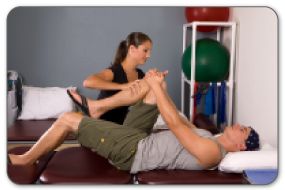 PT can assist you in stretching the gluteus maximus tendon/muscle and IT band if they are tight. If the gluteus maximus tendon or iliotibial tract have thickened, frayed and/or become inflamed you can treat the injury with conservative treatment methods to heal tough connective tissue such as tendons, muscles and ligaments. Once swelling is reduced with application of a Cold Compress or Ice Pack, treating the area with a Back/Hip TShellz Wrap® will help induce an increase in blood flow while also temporarily increasing the flexibility of soft tissue in the area. This should help alleviate the symptoms of muscle strain quite quickly. In most cases, utilizing home conservative treatments such as a Cold Compress or Ice Pack and the TShellz Wrap®, combined with rest and a stretching regimen will help or -at minimum- reduce the severity of a muscle injury such as muscle strains, muscle spasms or partial muscle tears in the hip. Learn more about conservative treatments for the hip here. We've helped thousands of people treat their painful injuries and conditions to get them back on the road to a pain-free life! Click HERE to Go To Our Online Store We take all major credit cards and Paypal. Product Advisors are available 9:00 am to 5:00 pm Eastern Standard Time Monday to Friday. Learn More About Hip Joint Injuries & TreatmentsI want to learn more about Hip Surgery & Post-Surgery Recovery I want to learn more about Circulation Boost I want to learn more about Ice & Heat: Which Is Better For The Hip? I want to learn more about Trigger Points in the Hip I want to learn more about Hip Surgery: Do I Need It? During your recovery, you will probably have to modify and/or eliminate any activities that cause pain or discomfort at the location of your soft tissue injury until the pain and inflammation settle. Always consult your doctor and/or Physical Therapist before using any of our outstanding products, to make sure they are right for you and your condition. The more diligent you are with your treatment and rehabilitation, the faster you will see successful results! |
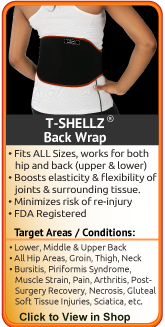 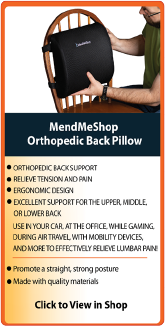 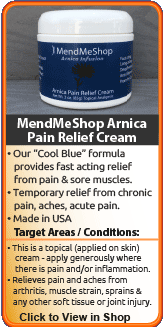 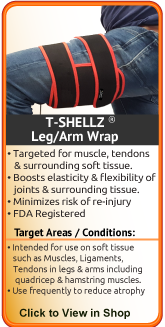 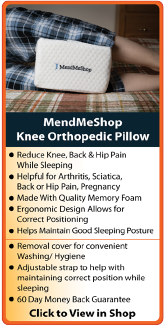   |

